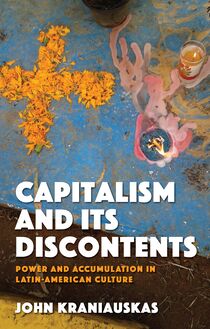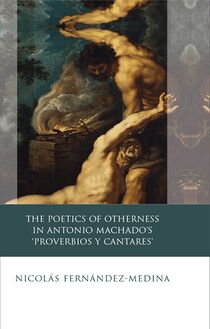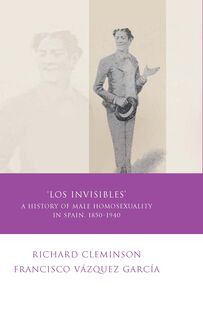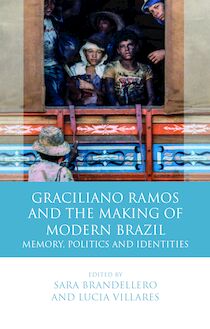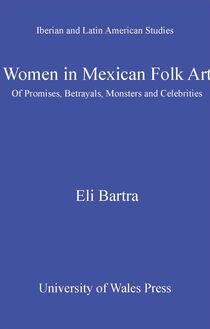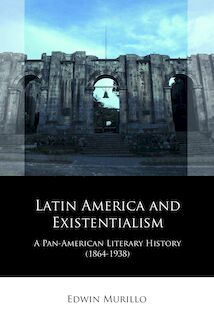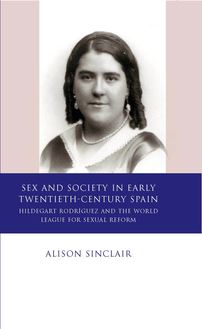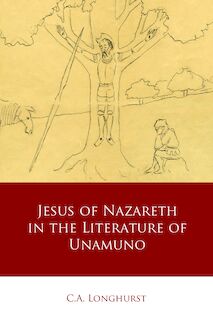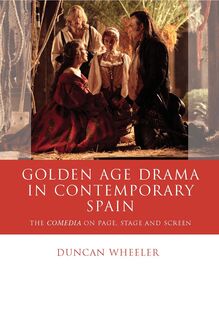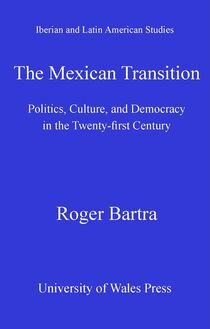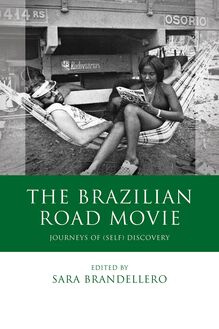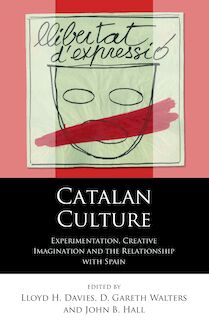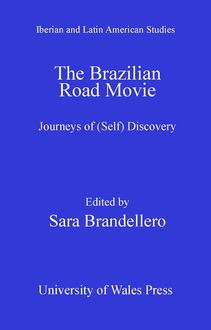Golden Age Drama in Contemporary Spain , livre ebook
137
pages
English
Ebooks
2012
Vous pourrez modifier la taille du texte de cet ouvrage
Obtenez un accès à la bibliothèque pour le consulter en ligne En savoir plus
Découvre YouScribe en t'inscrivant gratuitement
Découvre YouScribe en t'inscrivant gratuitement
137
pages
English
Ebooks
2012
Vous pourrez modifier la taille du texte de cet ouvrage
Obtenez un accès à la bibliothèque pour le consulter en ligne En savoir plus
Publié par
Date de parution
15 avril 2012
Nombre de lectures
1
EAN13
9781783165018
Langue
English
Poids de l'ouvrage
4 Mo
This is the first monograph on the performance and reception of sixteenth- and seventeenth- century national drama in contemporary Spain, which attempts to remedy the traditional absence of performance-based approaches in Golden Age studies. The book contextualises the socio-historical background to the modern-day performance of the country’s three major Spanish baroque playwrights (Calderón de la Barca, Lope de Vega and Tirso de Molina), whilst also providing detailed aesthetic analyses of individual stage and screen adaptations.
Publié par
Date de parution
15 avril 2012
Nombre de lectures
1
EAN13
9781783165018
Langue
English
Poids de l'ouvrage
4 Mo
IBERIAN AND LATIN AMERICAN STUDIES
Golden Age Drama in Contemporary Spain
Series Editors
Professor David George (Swansea University) Professor Paul Garner (University of Leeds)
Editorial Board
David Frier (University of Leeds) Lisa Shaw (University of Liverpool) Gareth Walters (Swansea University) Rob Stone (Swansea University) David Gies (University of Virginia)
Catherine Davies (University of Nottingham) Richard Cleminson (University of Leeds)
IBERIAN AND LATIN AMERICAN STUDIES
Golden Age Drama in Contemporary Spain
The Comedia on Page, Stage and Screen
DUNCAN WHEELER -->
UNIVERSITY OF WALES PRESS CARDIFF 2012
© Duncan Wheeler, 2012
All rights reserved. No part of this book may be reproduced in any material form (including photocopying or storing it in any medium by electronic means and whether or not transiently or incidentally to some other use of this publication) without the written permission of the copyright owner except in accordance with the provisions of the Copyright, Designs and Patents Act 1988. Applications for the copyright owner s written permission to reproduce any part of this publication should be addressed to The University of Wales Press, 10 Columbus Walk, Brigantine Place, Cardiff CF10 4UP.
www.uwp.co.uk
British Library CIP
A catalogue record for this book is available from the British Library.
ISBN 978-0-7083-2474-5 (paperback)
978-0-7083-2473-8 (hardback)
e-ISBN 978 - 1 - 7831 - 6501 - 8
The right of Duncan Wheeler to be identified as author of this work has been asserted in accordance with sections 77, 78 and 79 of the Copyright, Designs and Patents Act 1988.
The publisher has no responsibility for the persistence or accuracy of URLs for any external or third-party internet websites referred to in this book, and does not guarantee that any content on such websites is, or will remain, accurate or appropriate.
Cover image: La dama boba , 2006, Manuel Iborra (dir.); courtesy DeA Planeta.
Contents
_________________
Series Editors Foreword
List of Illustrations
Translations of Play Titles
List of Abbreviations
Acknowledgements
Introduction
Chapter 1:
The performance history of Golden Age drama in Spain (1939-2009)
Chapter 2:
An (early) modern classic: Fuente Ovejuna in contemporary Spain
Chapter 3:
Resurrecting lost traditions? Calderón s wife-murder plays and the CNTC
Chapter 4:
Cinema and Golden Age drama: the comedia goes to the movies
Chapter 5:
Locating Spanish classical drama in (inter)national contexts: Almagro, the CNTC and the RSC
Conclusion
Notes
Works Cited
Series Editors Foreword
_________________
Over recent decades the traditional languages and literatures model in Spanish departments in universities in the United Kingdom has been superceded by a contextual, interdisciplinary and area studies approach to the study of the culture, history, society and politics of the Hispanic and Lusophone worlds - categories that extend far beyond the confines of the Iberian Peninsula, not only in Latin America but also to Spanish-speaking and Lusophone Africa.
In response to these dynamic trends in research priorities and curriculum development, this series is designed to present both disciplinary and interdisciplinary research within the general field of Iberian and Latin American Studies, particularly studies that explore all aspects of cultural production (inter alia literature, film, music, dance, sport) in Spanish, Portuguese, Basque, Catalan, Galician and indigenous languages of Latin America. The series also aims to publish research in the History and Politics of the Hispanic and Lusophone worlds, at the level of both the region and the nation-state, as well as on Cultural Studies that explore the shifting terrains of gender, sexual, racial and postcolonial identities in those same regions.
List of Illustrations
_________________
Front Cover:
Still from film of La dama boba (Manuel Iborra, 2006). Courtesy of DeA Planeta.
Figure 1:
Photograph of Marta la piadosa (dir. Alberto González Vergel, 1975), Teatro Español. Courtesy of the Museo Nacional del Teatro, Almagro.
Figure 2:
Photograph by Ros Ribas of El vergonzoso en palacio (dir. Adolfo Marsillach, 1989), CNTC. Courtesy of the CNTC.
Figure 3:
Photograph by Agustín Espinel of Los balcones de Madrid (dir. Ángel Gutiérrez, 2007), Teatro de Cámara Chejov. Courtesy of the Teatro de Cámara Chejov.
Figure 4:
Sketch for Fuente Ovejuna (1965) by José Caballero. Courtesy of the Museo Nacional del Teatro, Almagro.
Figure 5:
Photograph of Fuente Ovejuna (dir. Emilio Hernández, 1999), CAT. Courtesy of the CAT.
Figure 6:
Photograph by Ros Ribas of El médico de su honra (dir. Adolfo Marsillach, 1986), CNTC. Courtesy of the CNTC.
Figure 7:
Photograph by Chicho of El pintor de su deshonra (dir. Eduardo Vasco, 2008), CNTC. Courtesy of the CNTC.
Figure 8:
Photograph by Chicho of El pintor de su deshonra (dir. Eduardo Vasco, 2008), CNTC. Courtesy of the CNTC.
Figure 9:
Still from film of El alcalde de Zalamea (José G. Maesso, 1954). Courtesy of Video Mercury.
Figure 10:
Still from film of El príncipe encadenado [ The Prince in Chains ] (Luis Lucia, 1960). Courtesy of Video Mercury.
Figure 11:
Backstage still from La dama boba (Manuel Iborra, 2006). Courtesy of DeA Planeta.
Figure 12:
Photograph by Ros Ribas of La vida es sueño (dir. Calixto Bieito, 2000), CNTC and Teatre Romea. Courtesy of the CNTC.
Figure 13:
Photograph by Nicolas Trémouilhe of Pavón Theatre. Courtesy of Nicolas Trémouilhe.
Translations of Play Titles
_________________
A secreto agravio, secreta venganza [ Secret Vengeance for Secret Offense ]
Abre el ojo [ Open your Eye ]
Absalón [ Absalom ]
El acero de Madrid [ The Steel-Water of Madrid ]
El alcalde de Zalamea [ The Mayor of Zalamea ]
Amar después de la muerte [ Love After Death ]
Antes que todo es mi dama [ My Lady First of All ]
El anzuelo de Fenisa [ Fenisa s Bait ]
Ardor con ardor se apaga [ Ardour Extinguishes Ardour ]
El arrogante español [ The Arrogant Spaniard ]
Arte nuevo de hacer comedias [ New Art of Making Plays ]
Asalto a una ciudad [ Assault on a City ]
El astrólogo fingido [ The Fake Astrologer ]
Bajarse al moro [ Going Down to Marrakesh ]
Los balcones de Madrid [ The Balconies of Madrid ]
La bella aurora [ The Fair Aurora ]
La bella malmaridada [ The Mismarried Beauty ]
Las bizarrías de Belisa [ The Gallantries of Belisa ]
El burlador de Sevilla [ The Trickster of Seville ]
El caballero de milagro [ The Knight of the Miracle ]
El caballero de Olmedo [ The Knight from Olmedo ]
Calderón enamorado [ Calderón in Love ]
Casa con dos puertas mala es de guardar [ A House with Two Doors is Difficult to Guard ]
El casamiento engañoso [ The Deceitful Marriage ]
Castelvines y Monteses [ The Capulets and Montagues ]
El castigo sin venganza [ Punishment without Revenge ]
Céfiro agreste de olímpicos embates [ A Zephry Toughened by Olympic Battle ]
La cena del rey Baltasar [ Belshazzar s Feast ]
La cisma de Inglaterra [ The Schism in England ]
Los comendadores de Córdoba [ The Knight Commanders of Córdoba ]
Con quien vengo, vengo [ I Will Come with Whoever Comes with Me ]
El condenado por desconfiado [ Damned for Despair ]
La cueva de Salamanca [ The Salamanca Cave ]
La dama de Alejandría [ The Lady from Alexandria ]
La dama boba [ Lady Nitwit ]
La dama duende [ The Phantom Lady ]
La dama del Olivar [ The Lady of the Olive Grove ]
Dar tiempo al tiempo [ Give Time the Time It Takes ]
¿De cuándo acá nos vino? [ When did this Befall us? ]
Desde Toledo a Madrid [ From Toledo to Madrid ]
El desdén con el desdén [ Disdain with Disdain ]
La desdichada Estefanía [ Unfortunate Stephanie ]
El despertar a quien duerme [ To Wake he who Sleeps ]
La devoción de la cruz [ Devotion to the Cross ]
La discreta enamorada [ The Clever Girl in Love ]
Don Gil de las calzas verdes [ Don Gil of the Green Breeches ]
Ello dirá [ That Will Tell ]
Los embustes de Celauro [ Celauro s Tricks ]
Los encantos de la culpa [ The Sorceries of Sin ]
La Estrella de Sevilla [ The Star of Seville ]
Farsa del triunfo del Sacramental [ The Farce of the Sacramental Triumph ]
Las ferias de Madrid [ The Fairs of Madrid ]
La fianza satisfecha [ A Bond Honoured ]
La fiera, el rayo y la piedra [ The Fierce, the Ray and the Rock ]
Fiesta barroca [ Baroque Festivities ]
Fuente Ovejuna [ The Sheep Well ]
La fuerza lastimosa [ The Pitiful Force ]
El galán fantasma [ The Phantom Suitor ]
El gran mercado del mundo [ The Great Market of the World ]
El gran teatro del mundo [ The Great Theatre of the World ]
Los guanches de Tenerife y conquista de Canarias [ The Guanches from Tenerife and the Conquest of the Canary Islands ]
La hidalga del valle [ The Noblewoman of the Valley ]
El hijo pródigo [ The Prodigal Son ]
La hija del aire [ The Daughter of the Air ]
El honroso atrevimiento [ The Honourable Audacity ]
El hospital de los locos [ The Madman s Hospital ]
El jardín de Falerina [ Falerina s Garden ]
El José de las mujeres [ The Female Joseph ]
El lindo don Diego [ The Handsome Don Diego ]
Los locos de Valencia [ Madness in Valencia ]
Lope de Vega a capa y espada [ A Cloak and Dagger Lope de Vega ]
El maestro de danzar [ The Dancing Master ]
El mágico prodigioso [ The Prodigious Magician ]
La malcasada [ The Unhappy Bride ]
Las manos blancas no ofenden [ White Hands do not Offend ]
Mañanas de abril y mayo [ April and May Mornings ]
Marta la piadosa [ Pious Martha ]
El mayor hechizo, amor [ Love, the Greatest Enchantment ]
El médico de su honra [ The Physician of his Honour ]
El mejor alcalde, el rey [ The Best Mayor, the King ]
Mejor está que estaba [ Tis Better Than it Was ]
El mejor mozo de España [ The Best Boy in Spain ]
El monstruo de los jardines [ The Monster of the Gardens ]
La m
